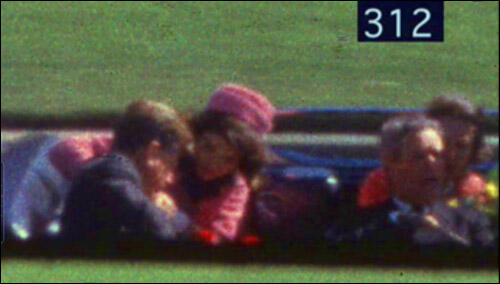On this day on 30th August
On this day in 1893 Huey Long, the seventh of nine children, was born in Winnfield, Louisiana. After leaving school he worked as a salesman in Texas and Tennessee before enrolling in the Tulane University Law School in New Orleans in 1914. He completed the three-year course in eight months and became a lawyer at the age of 21.
Long established his law practice in Winnfield. He soon developed a reputation as a champion of the common people. He later said "my cases in Court were on the side of the small man - the underdog." He added "I have never taken a suit against a poor man."
A member of the Democratic Party, Long supported S. J. Harper in his campaign against limited employers' liability. Long also successfully defended Harper, an opponent of American involvement in the First World War, after his anti-war activities led to him being charged under the Espionage Act.
In 1918 Long won election as state railroad commissioner for the northern district of Louisiana. The following year he supported John M. Parker, in his successful campaign to become Governor of Louisiana. However, in 1919 Long began attacking Governor Parker for failing to increase taxes on Standard Oil. In 1921 Long became chairman of the Public Services Commission and over the next couple of years successfully achieves lower telephone, gas and electric rates, railroad and streetcar fares and a severance tax on oil.
Long ran for office as Governor of Louisiana in 1928. Education was the main theme of his election campaign. As he pointed out, Louisiana's illiteracy rate of 22 per cent was the highest in the United States. Long's attacks on the utilities industries and the privileges of corporations were popular and he won the election by the largest margin in the state's history (92,941 votes to 3,733).
Once in power Long condemned the state's ruling hierarchy and attempted to replace it with his own supporters. In this way he gained control of the Hospital Board, the Highway Commission, the Levee Board and the Dock Board. He also forced state employees to distribute his newspaper, the Louisiana Progress. Long also attempted to capture the Democratic State Central Committee.
Long's critics accused him of being a dictator but he did introduce important reforms. This included the provision of free school textbooks, free night school courses for adult illiterates and increased expenditure on the state university.
In 1928, Louisiana only had 331 miles of paved roads. When Long gained power he launched an infrastructure programme aimed at building 3,000 miles of roads and establishing schools within walking distance of all the state's white children. To pay for the roads and schools that were built in Louisiana, Long increased taxes on local corporations.
The journalist, Raymond Gram Swing, went to visit Long: "I attended two other sessions with his approval, one of a special meeting of the legislature in the skyscraper statehouse at Baton Rouge, the other of the Ways and Means Committee, both called to take care of thirty-five bills introduced by the Long machine. The Senator was at both meetings running things without the slightest right of membership. Nobody objected. This was Huey's legislature, his committee, his statehouse, his state. At the special session of the legislature, he answered questions from the floor.... In the committee meeting at nine the next morning, Long read and explained each bill, then the chairman put it to a vote, smashing down his gavel. Here, too, he had no right to take part in the proceedings, but no one objected. The committee consisted of fifteen Long supporters and two oppositionists. Three bills were approved in the first six minutes, thirty-five were acted on in seventy minutes, all but one being approved."
Despite his criticisms of the way Long governed, Swing admitted that some of his reforms helped the poor: "This has to be said for Huey Long: he had strong liberal instincts and left to his credit a list of reforms not to be matched in any other Southern state. He shifted the burden of taxation from the poor to those who could afford to bear it. To finance his reforms, he increased the state's indebtedness from $11,000,000 to $150,000,000, but met each increase by new taxation. He passed legislation postponing the payment of private debt. He laid out a system of highways and bridges, and, above all, he dedicated himself to improving the state's education. He remodeled the school system to enable eight-month terms to be maintained in the poorest parishes and provided free textbooks. He strongly supported the Julius Rosenwald campaign against illiteracy, so that 100,000 adults in Louisiana, white and black, learned to read and write in his first term as governor. He backed Louisiana State University, assured it a good faculty, added a medical and dental school, and increased its enrollment from 1,500 to 4,000 in his first term as governor. As governor, he fought the public-utility companies and forced down power and telephone rates. He obtained a reduction of electricity rates in New Orleans. He built a five-million-dollar statehouse, an impressive high-tower building rising on the bank of the Mississippi."
Huey Long also attempted to increase revenues by imposing a new tax on the oil industry. The legislature rejected the measure and attempts were made to impeach Long. He was accused of misappropriating state funds and making illegal loans. However, the Senate failed to convict Long by two votes and afterwards it was claimed he had bribed several senators in order to get the right result.
In 1930 Long was elected to the Senate. To keep full control of Louisiana he installed an old friend, Alvin King, the president of the state senate, to act as governor. In the Senate he was highly critical of President Herbert Hoover and the way his government was dealing with the Great Depression.
William E. Leuchtenburg has argued: "Huey clowned his way into national prominence. A tousled redhead with a cherubic face, a dimpled chin, and a pug nose, he had the physiognomy of a Punchinello. He wore pongee suits with orchid-colored shirts and sported striped straw hats, watermelon-pink ties, and brown and white sport shoes... He had mastered a brand of humor which pricked the pretenses of respectability, which appealed to men convinced that beneath the cloth of the jurist sat the fee-grabbing lawyer, beneath the university professor the carnival faker, and, most of all, beneath the statesman the self-serving politician."
In the summer of 1932 Long took on the Democratic Party machine when he decided to support Hattie Caraway, the first women to be elected to Congress, in her bid to hold her seat in the Senate. Joseph T. Robinson and other leaders of the party in Arkansas were opposed to the idea and told her she would not win the party nomination. Caraway approached Long and he agreed to help her in her campaign and she defeated her nearest competitor by two to one.
Long supported the presidential campaign of Franklin D. Roosevelt. However, after his election, he was highly critical of some aspects of the New Deal. He disliked the Emergency Banking Act because it did little to help small, local banks. He bitterly attacked the National Recovery Act for the system of wage and price codes it established. He correctly forecasted that the codes would be written by the leaders of the industries involved and would result in price-fixing. Long told the Senate: "Every fault of socialism is found is this bill, without one of its virtues."
Long also claimed that Roosevelt had done little to redistribute wealth. When Roosevelt refused to introduce legislation to place ceilings on personal incomes, private fortunes and inheritances, Long launched his Share Our Wealth Society. In February 1934. He told the Senate: "Unless we provide for redistribution of wealth in this country, the country is doomed." He added the nation faced a choice, it could limit large fortunes and provide a decent standard of life for its citizens, or it could wait for the inevitable revolution.
Long quoted research that suggested "2% of the people owned 60% of the wealth". In one radio broadcast he told the listeners: "God called: 'Come to my feast.' But what had happened? Rockefeller, Morgan, and their crowd stepped up and took enough for 120,000,000 people and left only enough for 5,000,000 for all the other 125,000,000 to eat. And so many millions must go hungry."
Long's plan involved taxing all incomes over a million dollars. On the second million the capital levy tax would be one per cent. On the third, two per cent, on the fourth, four per cent; and so on. Once a personal fortune exceeded $8 million, the tax would become 100 per cent. Under his plan, the government would confiscate all inheritances of more than one million dollars.
This large fund would then enable the government to guarantee subsistence for everyone in America. Each family would receive a basic household estate of $5,000. There would also be a minimum annual income of $2,000 per year. Other aspects of his Share Our Wealth Plan involved government support for education, old-age pensions, benefits for war veterans and public-works projects.
Some critics pointed out that all wealth was not in the form of money. Most of America's richest people had their wealth in land, buildings, stocks and bonds. It would therefore be very difficult to evaluate and liquidate this wealth. When this was put to Long he replied: "I am going to have to call in some great minds to help me."
Leaders of the Communist Party and Socialist Party also attacked Long's plan. Alex Bittelman, a communist in New York wrote: "Long says he wants to do away with concentration of wealth without doing away with capitalism. This is humbug. This is fascist demagogy." Norman Thomas claimed that Long's Share Our Wealth scheme was insufficient and a dangerous delusion. He added that it was the "sort of talk that Hitler fed the Germans and in my opinion it is positively dangerous because it fools the people."
Long admitted that certain aspects of his scheme was socialistic. He said to a reporter from The Nation: "Will you please tell me what sense there is running on a socialist ticket in America today? What's the use of being right only to be defeated?" On another occasion he argued: "We haven't a Communist or Socialist in Louisiana. Huey P. Long is the greatest enemy that the Communists and Socialists have to deal with."
Some economists claimed that if the Share Our Wealth plan was implemented it would bring an end to the Great Depression. They pointed out that one of the major causes of the economic downturn was the insufficient distribution of purchasing power among the population. If poor families had their incomes increased they would spend this extra money on goods being produced by American industry and agriculture and would therefore stimulate the economy and create more jobs.
Long employed Gerald L. K. Smith, a Louisiana preacher, to travel throughout the South to recruit members for the Share our Wealth Clubs. The campaign was a great success and by 1935 there was 27,000 clubs with a membership of 4,684,000 and a mailing list of over 7,500,000.
Attempts were made to smear Long. One friend wrote that when Long "launched a campaign to limit the size of fortunes a price was set on his head and thugs were employed by big business to rub him from the national picture." Stories began circulating that Long was an alcoholic and to protect himself he gave up drinking and avoided visiting night clubs.
Long's radical ideas did appeal to progressives in the Congress and he gained support from Gerald Nye, William Borah, Henrik Shipstead, Bronson Cutting, Lynn Frazier, Robert LaFollette Jr., John Elmer Thomas, Burton K. Wheeler and George Norris. In October 1933, he published his autobiography, Every Man a King. One reviewer described the book as "unbalanced, vulgar, in many ways ignorant, and quite reckless." Long also began publishing American Progress . Financed by political contributions from his organization in Louisiana, Long mailed it free to his supporters. Normally 300,000 copies were sold per issue but for special editions 1.5 million were printed.
In 1934 Long convened a special session of the legislature in Louisiana and pushed through bills that placed electoral machinery in the governor's hands, outlawing interference by the courts with his use of national guardsmen, and creating his own secret police.
Raymond Gram Swing argued in The Nation in January, 1935. "He (Long) is not a fascist, with a philosophy of the state and its function in expressing the individual. He is plain dictator. He rules, and opponents had better stay out of his way. He punishes all who thwart him with grim, relentless, efficient vengeance. But to say this does not make him wholly intelligible. One does not understand the problem of Huey Long or measure the menace he represents to American democracy until one admits that he has done a vast amount of good for Louisiana. He has this to justify all that is corrupt and peremptory in his methods. Taken all in all, I do not know any man who has accomplished so much that I approve of in one state in four years, at the same time that he has done so much that I dislike. It is a thoroughly perplexing, paradoxical record."
In May 1935 Huey Long began having talks with Charles Coughlin, Francis Townsend, Gerald L. K. Smith, Milo Reno and Floyd B. Olson about a joint campaign to take on President Franklin D. Roosevelt in the 1936 presidential elections. Two months later Long announced that his police had discovered a plot to kill him. He now surrounded himself with six armed bodyguards. In August 1935, Long announced his candidacy for the presidency.
A shoe salesman from Chicago wrote a letter to Long: "I voted for President Roosevelt but it seems Wall Street has got him punch drunk. What we need is men with guts to go farther to the left as you advocate." Milo Reno, the leader of the radical Farmers' Holiday Association, introduced Long at a meeting as "the hero whom God in his goodness has vouchsafed to his children" in compensation for "Roosevelt, Wallace, Tugwell and the rest of the traitors."
Over the years, Long had been in constant conflict with Judge Benjamin Pavy of St. Landry Parish. Unable to unseat Pavy in St. Landry Parish, Long decided to gain revenge by having two of the judge's daughters dismissed from their teaching jobs. Long also warned Pavy that if he continued to oppose him he would say that his family had "coffee blood". This was based on the story that Pavy's father-in-law, had a black mistress.
On 8th September, 1935, Pavy's son-in-law, Carl Weiss was told that rumours were circulating that his wife was the daughter of a black man. Weiss was furious when he heard the news and decided to pay Long a visit in the State Capitol Building. Long was in the governor's office, and so he waited by a marble pillar in the corridor. When Long left the office with John Fournet and six bodyguards, Weiss pulled out a .32 automatic and aimed it at Long. Weiss fired and hit Long in the abdomen. The bodyguards opened fire and Weiss died on the spot. A bullets fired by one of the bodyguards ricocheted off the pillar and hit Long in the lower spine.
At first it was thought that Huey Long was not seriously wounded and an operation was carried out to repair his wounds. However, the surgeons had failed to detect that one of the bullets had hit Long's kidney. By the time this was discovered, Long was to weak to endure another operation and died on 10th September, 1935. According to his sister, Lucille Long, his last words were: "Don't let me die, I have got so much to do." His book, My First Days in the White House, was published posthumously.
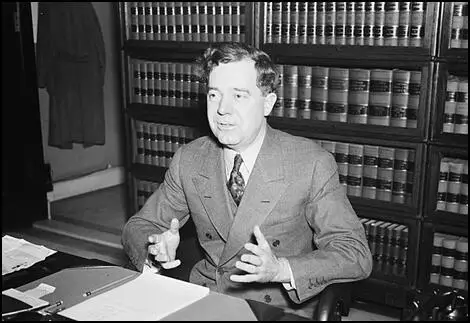
On this day in 1914 a sermon given by Rev. W. Youard at St. Swithun's Church, East Grinstead.
"I would say to every able-bodied young man in East Grinstead to offer yourself without delay in the service of your country. The Welsh Rugby Union Committee has passed a resolution declaring it the duty of all football players to join immediately. Blackheath Rugby Football Club has cancelled all its matches for the same reason. That is the right spirit. I hope it will be imitated by our own clubs. Go straight to the recruiting officer and offer yourself. That is the plain duty of every able-bodied young man today."
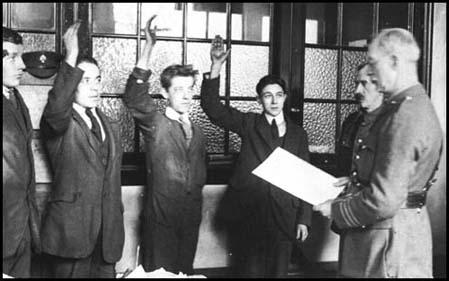
On this day in 1914 the Germans defeat the Russians in the Battle of Tannenberg. On the outbreak of the First World War General Alexander Samsonov was given command of the Russian Second Army for the invasion of East Prussia. He advanced slowly into the south western corner of the province with the intention of linking up with General Paul von Rennenkampf advancing from the north east.
The commander of the German Eighth Army, General Maximilian Prittwitz, was dismissed for ordering the retreat when faced with the Russian Second Army. General Paul von Hindenburg and General Erich Ludendorff were sent forward to meet Samsonov's advancing troops. They made contact on 22nd August, 1914, and for six days the Russians, with their superior numbers, had a few successes. However, by 29th August, Samsanov's Second Army was surrounded.
General Alexander Samsonov attempted to retreat but now in a German cordon, most of his troops were slaughtered or captured. Only 10,000 of the 150,000 Russian soldiers managed to escape. Shocked by the disastrous outcome of the battle, Samsanov committed suicide. The Germans, who lost 20,000 men in the battle, were able to take over 92,000 Russian prisoners. In Britain, all news of the Russian defeat at Tannenberg was kept from the public.
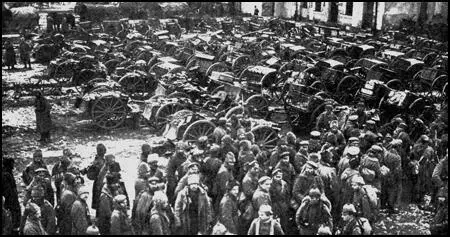
On this day in 1917 Denis Healey, the son of an engineer, was born in Mottingham. Five years later his family moved to Keighley. When Healey was eight years old he won a scholarship to Bradford Grammar School. Influenced by the poetry of Wilfred Owen and Siegfried Sassoon from the First World War, Healey became a pacifist and in 1935 resigned from the school's Officer's training Corps.
In 1936 Healey entered Balliol College, Oxford. While at university he became active in politics. He became concerned about the emergence of Adolf Hitler. He rejected his earlier pacifism and joined the Communist Party.
Healey later explained in his autobiography, The Time of My Life, why he took this decision: "For the young in those days, politics was a world of simple choices. The enemy was Hitler with his concentration camps. The objective was to prevent a war by standing up to Hitler. Only the Communist Party seemed unambiguously against Hitler. The Chamberlain Government was for appeasement. Labour seemed torn between pacifism and a half-hearted support for collective security, and the Liberals did not count."
On the outbreak of the Second World War joined the British Army and he served with the Royal Engineers in North Africa, Sicily and Italy. This included being Military Landing Officer to the British assault brigade for Anzio. He admitted: "Unfashionable though it is to admit it, I enjoyed my five years in the wartime army. It was a life very different from anything I had known, or expected. Long periods of boredom were broken by short bursts of excitement. For the first time I had to learn to do nothing but wait - for me the most difficult lesson of all. To my great relief, I found I did not get frightened in action - not that I enjoyed being shelled or dive-bombed any more than the next man; but fear never paralysed me or even pushed me off my stroke. On the other hand I was never called on to show the sort of active courage which wins men the VC. A dumb, animal endurance is the sort of courage most men need in war. I was constantly amazed by the ability of the average soldier, and civilian, to exhibit this under stress." By the end of the war Healey had reached the rank of major.
Denis Healey left the Communist Party during the war and soon afterwards joined the Labour Party. He caught the attention of its leaders by making a speech at the 1945 Labour Party Conference: "The upper classes in every country are selfish, depraved, dissolute and decadent. The struggle for socialism in Europe ... has been hard, cruel, merciless and bloody. The penalty for participation in the liberation movement has been death for oneself, if caught, and, if not caught oneself, the burning of one's home and the death by torture of one's family ... Remember that one of the prices paid for our survival during the last five years has been the death by bombardment of countless thousands of innocent European men and women."
In the 1945 General Election he stood for Pudsey and Otley and was defeated by 1,651 votes. In November, 1945, Healey became secretary of the International Department of the Labour Party. In 1952 Healey was elected to the House of Commons. On the right of the party, Healey became an outspoken critic of Aneurin Bevan and his followers. In 1959 Hugh Gaitskell appointed Healey to the shadow cabinet.
When the Labour Party was elected in the 1964 General Election, Harold Wilson, the new prime minister, appointed Healey as his Secretary of State for Defence. Wilson later commented: "He (Healey) is a strange person. When he was at Oxford he was a communist. Then friends took him in hand, sent him to the Rand Corporation of America, where he was brainwashed and came back very right wing. But his method of thinking was still what it had been: in other words, the absolute certainty that he was right and everybody else was wrong, and not merely wrong through not knowing the proper answers, but wrong through malice. I had very little trouble with him on his own subject, but he has a very good quick brain and can be very rough. He probably intervened in Cabinet with absolute certainty about other departments more than any minister I have ever known, but he was a strong colleague and much respected."
His colleague, Ian Mikardo, has argued: "Denis Healey is an outstanding talent, equalled by very few people I've met in the whole of my long innings. When he speaks on international affairs, he speaks with the authority that derives from an unmatched knowledge of what's going on in almost every country in the world, and his analysis of all those movements of events is almost always penetrating and enlightening. He is a cultured man of parts, of many interests outside politics (those politicians whose lives contain nothing but politics are always second-class politicians). He's a bubbly, witty man who can be a charming and entertaining companion.
Over the next six years Healey attempted to preserve the country's defence commitments but he eventually had to accept defeat and began withdrawing Britain's armed forces from Aden and the Persian Gulf. Healey held the post until the defeat of the Labour government in the 1970 General Election.
Edward Heath and his Conservative government came into conflict with the trade unions over his attempts to impose a prices and incomes policy. His attempts to legislate against unofficial strikes led to industrial disputes. In 1973 a miners' work-to-rule led to regular power cuts and the imposition of a three day week. Heath called a general election in 1974 on the issue of "who rules". He failed to get a majority and Harold Wilson and the Labour Party were returned to power.
Harold Wilson appointed Healey as Chancellor of the Exchequer. At the 1973 Labour Party Conference he argued: " The main reason for this enormous foreign deficit is that he gave away four thousand million pounds in the last three years in tax reliefs, mainly to the rich, without cutting expenditure to scale and without making any attempt to be sure that British industry had the capacity to meet the consequent increase in demand, so we have had a steady increase in imports of manufactured goods, a yawning trade gap, and continual runs on sterling. But before you cheer too loudly, let me warn you that a lot of you will pay extra taxes, too. That will go for every Member of Parliament in this hall, including me ... There are going to be howls of anguish from the eighty thousand people who are rich enough to pay over seventy-five per cent on the last slice of their income. But how much do we hear from them today of the eighty-five thousand families at the bottom of the earnings scale who have to pay over seventy-five per cent on the last slice of their income - and thirty thousand of them actually lose twenty-five new pence or more, when their wages go up a pound?"
Healey was unable to solve Britain's economic problems and in 1976 Healey was forced to obtain a $3.9 billion loan from the International Monetary Fund. When Harold Wilson resigned that year , Healey stood for the leadership but was defeated by James Callaghan. The following year Healey controversially began imposing tight monetary controls. This included deep cuts in public spending on education and health. Critics claimed that this laid the foundations of what became known as monetarism. In 1978 these public spending cuts led to a wave of strikes (winter of discontent) and the Labour Party was easily defeated in the 1979 General Election.
In 1980 Healey once again contested the leadership of the Labour Party. The left campaigned against his nomination. Ian Mikardo argued in his autobiography Back Bencher (1988): "When the leadership election loomed in 1980 my friends in the Tribune Group and many other people in the Party and the trade unions wanted to stop Healey because he was way out to the Right and was likely to go even further than Wilson and Callaghan in leading the Party away from its socialist principles. But even though I shared that view I had an even stronger motivation for frustrating his leadership bid. I had seen at first hand his emery-paper abrasive manner, his crude strong-arm all-in-wrestling ways of dealing with dissent, his undisguised contempt for many of his colleagues, his actual enjoyment of confrontation, his penchant for pouring petrol on the flames of controversy, and I was thoroughly convinced that if he became Leader of the Party it wouldn't be long before these aggressive characteristics of the would split the Party from top to bottom; and that was a prospect which scared me."
Healey was unexpectedly defeated by Michael Foot and had to be satisfied with the post of deputy leader. Healey resigned from the Shadow Cabinet in 1987. His autobiography, The Time of My Life, was published in 1989.
Denis Healey died on 3rd October, 2015.
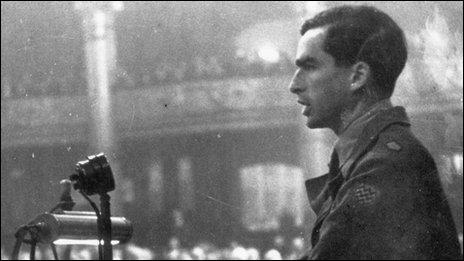
On this day in 1918 Fanya Kaplan makes statement to Cheka before execution.
"My name is Fanya Kaplan. Today I shot at Lenin. I did it on my own. I will not say whom I obtained my revolver. I will give no details. I had resolved to kill Lenin long ago. I consider him a traitor to the Revolution. I was exiled to Akatoi for participating in an assassination attempt against a Tsarist official in Kiev. I spent eleven years at hard labour. After the Revolution I was freed. I favoured the Constituent Assembly and am still for it."
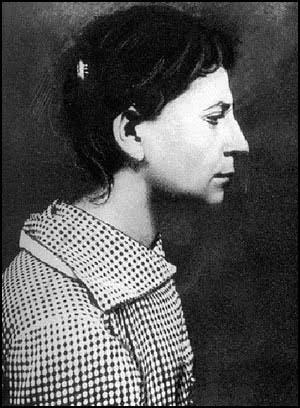
On this day in 1948 Fred Hampton was born in Chicago on 30th August 1948 and grew up in Maywood, a suburb of the city. A bright student, Hampton graduated from Proviso East High School in 1966 before enrolling at Triton Junior College where he studied law.
While a student Hampton became active in the civil rights movement. He joined the National Association for the Advancement of Coloured People (NAACP) and was appointed leader of the Youth Council of the organization's West Suburban branch.
In October 1966 Bobby Seale and Huey Newton formed the Black Panther Party in Oakland, California. Initially formed to protect local communities from police brutality and racism, the Black Panthers eventually developed into a Marxist revolutionary group. The group also ran medical clinics and provided free food to school children. Other important members included Stokely Carmichael, H. Rap Brown, Bobby Hutton and Eldridge Cleaver.
Hampton founded the Chicago chapter of the Black Panther Party in November 1968. He immediately established a community service program. This included the provision of free breakfasts for schoolchildren and a medical clinic that did not charge patients for treatment. Hampton also taught political education classes and instigated a community control of police project.
One of Hampton's greatest achievements was to persuade Chicago's most powerful street gangs to stop fighting against each other. In May 1969 Hampton held a press conference where he announced a nonaggression pact between the gangs and the formation of what he called a "rainbow coalition" (a multiracial alliance of black, Puerto Rican, and poor youths).
Later that year Hampton was arrested and charged with stealing $71 worth of sweets, which he then allegedly gave away to local children. Hampton was initially convicted of the crime but the decision was eventually overturned.
The activities of the Black Panthers in Chicago came to the attention of J. Edgar Hoover and the FBI. Hoover described the Panthers as "the greatest threat to the internal security of the country" and urged the Chicago police to launch an all-out assault on the organization. In 1969 the Panther party headquarters on West Monroe Street was raided three times and over 100 members were arrested.
In the early hours of the 4th December, 1969, the Panther headquarters was raided by the police for the fourth time. The police later claimed that the Panthers opened fire and a shoot-out took place. During the next ten minutes Fred Hampton and Mark Clark were killed. Witnesses claimed that Hampton was wounded in the shoulder and then executed by a shot to the head.
The panthers left alive, including Deborah Johnson, Hampton's girlfriend, who was eight months pregnant at the time, were arrested and charged with attempting to murder the police. Afterwards, ballistic evidence revealed that only one bullet had been fired by the Panthers whereas nearly a hundred came from police guns.
After the resignation of President Richard Nixon, the Senate Intelligence Committee conducted a wide-ranging investigation of America's intelligence services. Frank Church of Idaho, the chairman of the committee, revealed in April, 1976 that William O'Neal, Hampton's bodyguard, was a FBI agent-provocateur who, days before the raid, had delivered an apartment floor-plan to the Bureau with an "X" marking Hampton's bed. Ballistic evidence showed that most bullets during the raid were aimed at Hampton's bedroom.
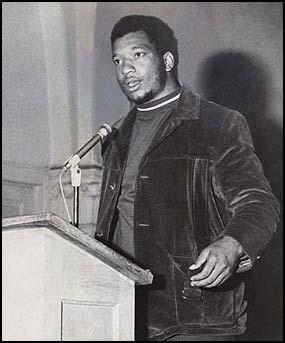
On this day in 1970 Abraham Zapruder died of cancer in Dallas.
Abraham Zapruder was born into a Russian-Jewish family in the city of Kovel in Ukraine on 15th May, 1905. During the turmoil of the Russian Civil War, the family emigrated to the United States and in 1920 settled in Brooklyn, New York.
Zapruder went to night school to learn English. He found work in the Garment District of Manhatten as a clothing pattern maker. He and his wife Lillian married in 1933, and had two children. In 1941 Zapruder moved to Dallas to work for Nardis, a local sportswear company.
According to Gregory Burnham Zapruder worked with Jeanne LeGon at the company: "In 1953 and 1954 a woman named, Jeanne LeGon worked side by side with Abraham Zapruder at a high end clothing design firm called, Nardis of Dallas. Jeanne LeGon designed the clothing and Abraham Zapruder cut the patterns and the material for her." In 1954, Zapruder co-founded Jennifer Juniors, a company that produced two clothing brands, Chalet and Jennifer Juniors. His offices were located in the Dal-Tex Building, just off Dealey Plaza in Dallas.
Gregory Burnham also argues that Zapruder was an "active member of 2 CIA Proprietary Organizations: The Dallas Council On World Affairs and The Crusade For A Free Europe." Other members included George De Mohrenschildt, Clint Murchison, David Byrd, George H. W. Bush, Neil Mallon and Haroldson L. Hunt.
On 22nd November, 1963, Abraham Zapruder filmed the motorcade of President John F. Kennedy. He later explained to Wesley J. Liebelerabout the background to the filming. "I didn't have my camera but my secretary (Lillian Rogers) asked me why I don't have it and I told her I wouldn't have a chance even to see the President and somehow she urged me and I went home and got my camera."
According to Jim Marrs: "Zapruder made a fourteen-mile round trip drive home to pick up his camera.By the time he returned, crowds were already gathering to watch the motorcade." Zapruder told the Warren Commission: "I thought I might take pictures from the window because my building is right next to the building where the alleged assassin was, and it's just across 501 Elm Street, but I figured - I may go down and get better pictures, and I walked down. I believe it was Elm Street and on down to the lower part, closer to the underpass and I was trying to pick a space from where to take those pictures and I tried one place and it was on a narrow ledge and I couldn't balance myself very much. I tried another place and that had some obstruction of signs or whatever it was there and finally I found a place farther down near the underpass that was a square of concrete I don't know what you call it maybe about 4 feet high." Zapruder decided to take his receptionist, Marilyn Sitzman, with him to Dealey Plaza.
Abraham Zapruder went on to tell Wesley J. Liebeler: "I heard the first shot and I saw the President lean over and grab himself like this (holding his left chest area)... I thought I heard two (shots), it could be three, because to my estimation I thought he was hit on the second - I really don't know. The whole thing that has been transpiring - it was very upsetting and as you see I got a little better all the time and this came up again and it to me looked like the second shot, but I don't know. I never even heard a third shot."
On his return to his office he told Lillian Rogers " to call the police or the Secret Service... I just went to my desk and stopped there until the police came and then we were required to get a place to develop the films. I knew I had something, I figured it might be of some help - I didn't know what." Zapruder's colour film shows the entire assassination sequence and became an important part of the evidence looked at by those investigating the assassination.
By 25th November, 1963, Zapuder's film had been sold to Life Magazine. In charge of the purchase was C. D. Jackson, a close friend of Henry Luce, the owner of the magazine. According to Carl Bernstein, Jackson was "Henry Luce's personal emissary to the CIA". When appearing before the Warren Commission, Zapruder claimed he received $25,000 and then gave this money to the Firemen's and Policemen's Benevolence. However, when the contract was eventually published it showed that Zapruder received $150,000 for the eighteen-second film.
Abraham Zapruder later testified before the Warren Commission, and the CBS: The Warren Report. The Zapruder Film was also an important part of the evidence used by the Warren Commission.
